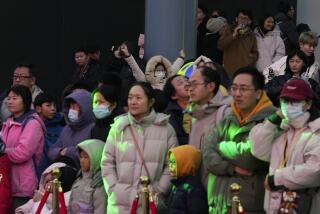China Gears Up for World’s Largest Head Count in July : Census: An army of 7 million is recruited to make sure that everyone possible is included in a tabulation exceeding 1 billion.
- Share via
BEIJING — How does a country count more than 1 billion people--especially if many don’t want to be counted?
China has started by drafting nearly 7 million census workers, more than the entire population of Finland.
Hundreds of thousands of training centers have been set up to teach the workers how to conduct the world’s biggest head count, which begins July 1 and will take about 10 days.
In addition, millions more Chinese have been mobilized to hang red banners in the streets, beat drums, sing songs and hand out publicity materials to popularize the slogan, “The population census--everyone is responsible.”
Most Chinese have responded with the passive acquiescence they give all government campaigns, such as those calling for killing flies or studying socialist labor models.
But the census, last held in 1982, strikes fear in the hearts of a substantial minority.
They are the millions of people who have moved to cities without permission, and millions of others who have violated family planning regulations by having more than one child.
Fearful of being fined thousands of dollars, parents often fail to register additional children and try to keep them deep secrets--hence their nickname “black children.”
“It’s very possible that there’s a black child in each (apartment) building,” said census worker Zhang Yuesi, who was taking part one recent afternoon in a pre-census trial in northeast Beijing’s Zuo Family Village neighborhood.
She and five other workers visited three households and filled out questionnaires as a practice run.
“We must deeply arouse the masses and do propaganda work among them” in order to get a correct count, said Zhang, a brisk woman who usually works in the municipal statistics bureau. Like other census workers, she was temporarily drafted in March to help make the count.
Census officials insist that they won’t punish anyone for having more than one child or living illegally in a city.
At a recent news conference, Zhang Sai, deputy director of the central government’s census “leading group,” or committee, promised that data on individual families won’t be shared with police or family planning officials.
But it is not the census questionnaire per se that worries some families.
It is the prolonged glare of official attention, including pre-census checks of household registrations--little booklets that list household members. One copy is kept at home, and one in the local police station.
Since spring, officials already have made door-to-door checks to confirm that registrations are up to date and have quizzed neighbors about suspect households. If there were any “black children” in Zuo Family Village, they likely were uncovered during this stage, when there was no confidentiality.
Zhang Yuesi, the census worker, didn’t want to release figures for her own turf. But she disclosed that in Fengtai, a rural area of Beijing, more than 300 unregistered children were found “in just one census district.”
Li Honggui, deputy director of the national census office, said some have speculated that the nationwide total of “black children” will reach several tens of millions.
The last census, in 1982, counted 1.03 billion people, and registered births and deaths since have produced a tentative count of 1.112 billion, making China by far the most populous country in the world.
India is No. 2 with 880 million people.
Zhang Sai said an exact figure is needed for the smooth running of China’s planned economy. That’s why census takers are going door to door this year, instead of asking residents to visit census stations as in the other three counts made during four decades of Communist rule.
Computers are playing a bigger role, too, replacing the abacus. First results will be released in October, and a detailed tabulation in 1992.
“Our standard is to be off by no more than one-thousandth,” said Zhang Yuesi, who is not related to Zhang Sai.
Peculiarities of China’s housing allocation system have created pitfalls that will test even the best-prepared counter.
Take the case of Liu Yugui, a retired union official in Zuo Family Village’s East No. 10 Building. His household registration book shows five people living in a two-room apartment.
In reality, his son, daughter and grandson have found unofficial housing elsewhere. But they often visit and spend the night, Liu said. Where should they be counted?
There are other special cases. Families swap assigned apartments, trying to move closer to work. Grown children marry outside Beijing but stay registered with their parents, hoping one day to return to the capital. Double-counting seems as much a risk as missing heads.
But most problems can be resolved with a simple rule, Zhang said: People will be counted at their place of registration unless they’ve lived somewhere else more than one year.
More to Read
Sign up for Essential California
The most important California stories and recommendations in your inbox every morning.
You may occasionally receive promotional content from the Los Angeles Times.










